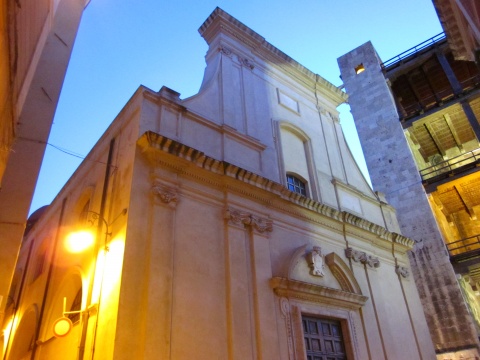The church is flanked by the vast complex of former College of Scolopi , which now houses the Artistic Lyceum. The renovation began in 1663, after the release of the buildings used as places of worship which had been banned until that year . The works ended only in late 1735 because of a long pause for unknown reasons in the first two decades of the 18th century. Restored and reopened to the public after the war, was closed again during the 70s. Since then, due to the endless renovation , the monument is not open and is in a total state of disrepair.
The building has significant differences in comparison with the previous places of worship in Cagliari , probably for the Scolopi's will to fulfill the functions of popular education , as well as worship. This characteristic does not exclude the twin resemblance with almost all the other Scolopi's buildings in the rest of Italy , often unchanging except for a few details in the inside, influenced by the local culture.The church, in Baroc Style, shows a harmonious main façade with a terminal plate , punctuated by pilasters of Ionic's capital. The portal is surmounted by a cornice broken curve tympanum, with the Scolopi's coat of arms in the inside.
The interior has a single nave with a barrel vault , with three communicating chapels for every side and a deep chancel covered by a dome on an octagonal tambour. It has often been noted that the technical approach is similar to the Dome of Cagliari.
The temple was decorated with many artworks, some of which are unfortunately lost , while others are currently stored in various churches in the city . Into the church, is still possible to see the imposing altar , date back to 1777 , by the sculptor Giovanni Battista Franco , in polychrome marble, and the marble pulpit date back to the same period . The last chapel ,on the right side, contains one of the bombs dropped on the College in 1793 , during the siege of the French, who tried to conquer the city , accompanied by a commemorative stone of the event. The vestry is decorated with attractive wooden furniture and murals that represent the foundation of the Scolopi's order.
Chiesa di San Giuseppe Calasanzio
Chiesa di San Giuseppe Calasanzio
Piazzetta San Giuseppe
City
CagliariAdd new review
Your review will be visible after approval by the editors
To post a review you must be an authenticated user.
Log in with Social Login
